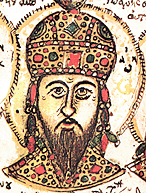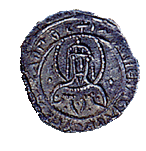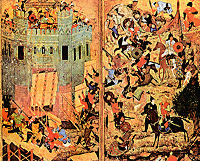 |
|
 |
Diplomatic moves
 he desperate situation in which Byzantium found itself at the end of
he desperate situation in which Byzantium found itself at the end of
 the 14th century forced
Manuel II
to turn to the West for help. To obtain this he sent delegations to the Pope, to the Doge of Venice, and to the Kings of France, England and Aragon. He even addressed pleas for charity and assistance to the megas doux of Russia,
Basil,
in 1398. At the same time, Patriarch
Anthony
urged the King of Poland to support the King of Hungary in a new crusade. the 14th century forced
Manuel II
to turn to the West for help. To obtain this he sent delegations to the Pope, to the Doge of Venice, and to the Kings of France, England and Aragon. He even addressed pleas for charity and assistance to the megas doux of Russia,
Basil,
in 1398. At the same time, Patriarch
Anthony
urged the King of Poland to support the King of Hungary in a new crusade.
The response of the Latins, although they shared the concern of the Byzantines, was not substantial. Only the King of France,
Charles VI,
sent a military force consisting of 1200 soldiers, under the command of Field Marshal Boucicaut, who, together with Manuel II, conducted operations of limited range in the environs of Constantinople and in Asia Minor. However the forces under his command were far too weak to avert
 the Turkish threat. He therefore persuaded Manuel II to solicit help from the West in person. Before setting out, the Emperor left his nephew,
John VII,
in charge of the Empire. the Turkish threat. He therefore persuaded Manuel II to solicit help from the West in person. Before setting out, the Emperor left his nephew,
John VII,
in charge of the Empire. Manuel set forth accompanied by Boucicaut on 10 December 1399. In April 1400 he arrived Venice. His next stop was Paris, in June 1400. In December of the same year he was in London, while February 1401 saw him again in Paris. Everywhere he was received with honours, but his pleas met only with vague answers. No substantial help was offered and Manuel II had
 to remain in Paris, as he did not even have the means to return home. There he waited, expecting at any moment to hear of the surrender of Constantinople to the
Ottomans,
since his regent, John VII, ruled under the influence of Sultan
Bayezid.
But the Ottoman defeat at the hands of the
Mongols
of
Timur (Tamerlane) in September 1402 near Ankara,
and the unrest that followed within the Ottoman state, averted such
a development and granted the weakened Byzantine Empire a reprieve of
almost another half century of life. to remain in Paris, as he did not even have the means to return home. There he waited, expecting at any moment to hear of the surrender of Constantinople to the
Ottomans,
since his regent, John VII, ruled under the influence of Sultan
Bayezid.
But the Ottoman defeat at the hands of the
Mongols
of
Timur (Tamerlane) in September 1402 near Ankara,
and the unrest that followed within the Ottoman state, averted such
a development and granted the weakened Byzantine Empire a reprieve of
almost another half century of life.
|